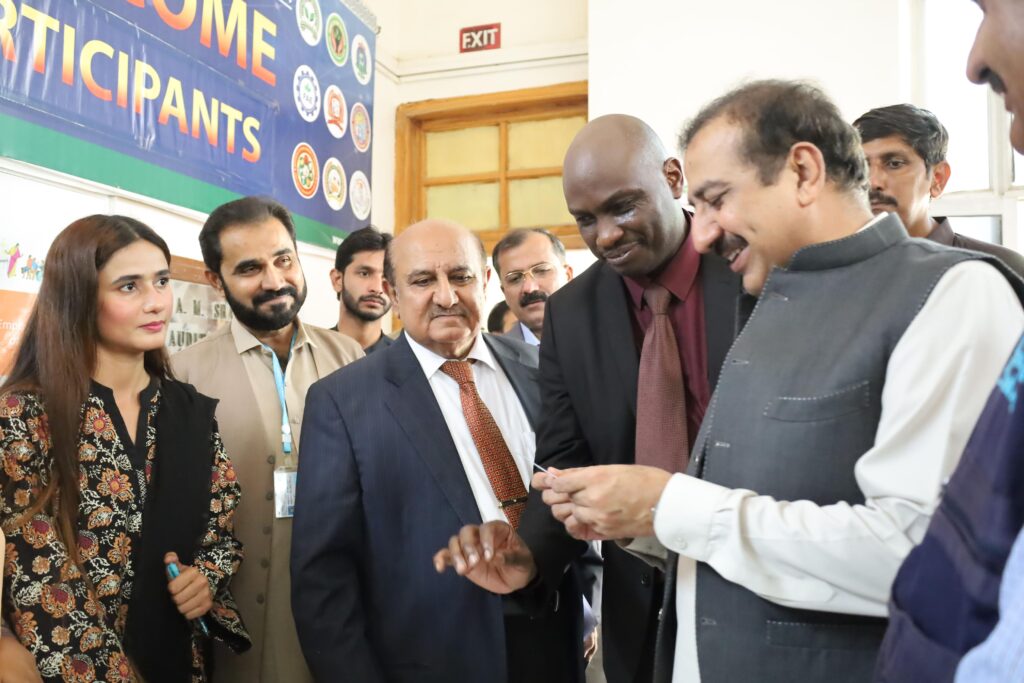
First-Ever Seminar on Review of Farmer Field Schools (FFS) Implementation in Sindh
Hyderabad: – In a landmark event, the first-ever seminar on the review of Farmer Field Schools (FFS) implementation in Sindh, Pakistan was held in Sindh Agriculture University. This two-day seminar brought together a wide range of stakeholders, including FFS practitioners, public extension services, academia, civil society organizations, and farmer groups from across the province. The event aimed to evaluate the progress of Farmer Field Schools, share lessons learned, and identify opportunities for scaling its impact to build more sustainable, inclusive, and resilient agrifood systems.
The seminar, organized in partnership with the Sindh Agriculture University, is part of a broader initiative to review and advance FFS practices globally. The session also explored how Farmer Field Schools can help farmers adapt to emerging challenges, such as climate change, while strengthening local economies and enhancing livelihoods. A key focus is on placing farmers at the center of transformation processes, emphasizing that they must be provided with the knowledge and capabilities to effectively participate in decision-making. This approach accelerates the transformation of agricultural and food systems in the region, ensuring that farmers become active stakeholders in their communities, not just passive beneficiaries.

In a virtual address to the participants of the Farmer Field Schools (FFS) seminar at Sindh Agriculture University, Secretary of Agriculture Sindh, Mr. Rafique Ahmed Buriro, highlighted the pivotal role of FFS in equipping farmers to face the evolving challenges of climate change. “In light of the urgent climate realities reshaping agriculture in our province, the outcomes of this seminar must guide actionable policy frameworks that empower our farmers with the knowledge and resilience to adapt,” he said. “We are committed to integrating FFS programming into our policies, ensuring that every farmer—especially those in remote areas—has the tools to thrive amid these changing conditions and actively drive sustainable transformation in our agriculture sector.”
James Robert Okoth, Head of FAO in Sindh Province, expressed optimism about the potential impact of the seminar, stating, “The insights gained from this two-day workshop are expected to shape the future of Farmer Field School programming in Sindh and across Pakistan. This detailed review, conducted in Sindh for the first time, marks a critical step in our long-term collaboration with Sindh Agriculture University and universities in Punjab to document best practices and refine the curriculum for higher education institutions.”
He emphasized that this process is part of a larger journey to ensure that lessons from the field directly inform the development of resilient and sustainable agrifood systems. “We deeply appreciate the support of our esteemed participants in this session. We look forward to sharing the outcomes of this event as we continue to advance FFS initiatives that empower farmers and strengthen agricultural education throughout Pakistan,” he concluded.
Vice Chancellor; Sindh Agriculture University, Dr Fateh Marri said climate change was having impacts on the agricultural sector evidently, requiring farmers to empower themselves to quickly adapt to those changes. “Farmers are the backbone of agriculture and by training them through the Farmer Field Schools (FFS), we can help them face climate challenges to drive sustainable growth,” he stated.
He said that while global agricultural productivity reached 100pc, Pakistan stood at 60pc, underlining a significant opportunity to enhance both economic resilience and farmer welfare. That gap highlighted need for agricultural development through co-creation where farmers, scientists, and institutions collaborated to drive innovation, he said.
Ms. Anne-Sophie Poisot, Leader of the Futuring Farmer Field Schools Unit at FAO, delivered a keynote address on the transformative potential of the Farmer Field Schools (FFS) methodology. She noted that FFS has evolved from its initial focus on Integrated Pest Management (IPM) to a comprehensive platform for farmer education, covering climate-resilient practices, rural entrepreneurship, and gender empowerment.
Ms. Poisot stressed the importance of scaling FFS to reach a global audience, with a goal to engage 40 million farmers by 2040. “Digital tools such as mobile apps, online platforms, and data-driven decision-making are key to expanding FFS, helping farmers access real-time information, improve practices, and monitor progress,” she explained. She highlighted the role of participatory learning in empowering farmers, stating, “FFS provides farmers not only with advice but the tools to innovate within their own communities. Knowledge is key to creating lasting change in agricultural and food systems.”
A key theme throughout the seminar is the promotion of gender-transforming approaches in FFS. Ms. Poisot highlighted the role of FFS in ensuring equal opportunities for men, women, and youth in farming communities, with a focus on inclusive development. This is particularly relevant in regions like Balochistan, where FFS programs are empowering women and youth to improve their livelihoods through access to new skills and resources.
The seminar includes a variety of presentations, an outdoor marketplace of poster presentations, and interactive discussions, allowing participants to share their experiences and innovations in FFS implementation. Through this exchange, the event aims to inspire future scaling efforts and improve the quality and impact of FFS programs across Pakistan.
The seminar is part of FAO’s broader strategy to scale the impacts of FFS worldwide, contributing to the development of fairer, more sustainable agrifood systems.